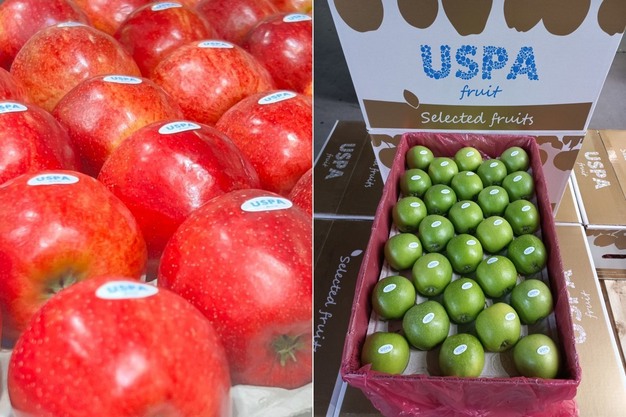It's been rough weather for the cultivation of apples this year, says Volodymyr Gurzhiy of Ukrainian apple exporter USPA Fruit: "This season, the weather in Ukraine was not favorable for the farmer, they had a lot to do to protect the future harvest. Late spring frosts, hail, heat, and then followed by rains during harvest. All of this resulted in a smaller harvest in terms of volume and a drop in quality, which later led to an even greater decrease in the harvest as it was put into storage. A large part of it was destined for the processing industry, as the price situation was maximally attractive in this sector. Prices for apples for processing were at a record high, both during the apple harvest and also at the present time."
Next to the challenges with weather, Gurzhiy emphasizes that the workforce has also posed a real problem this season. "Also, we have been experiencing a shortage of labor resources for several years, and this season this problem has already become critical, the farmers had to collect workers for harvesting even from neighboring regions, and labor wages also reached record levels. All these factors led to the fact that apple prices also reached their record highs, and there was no positive feedback from importers at the same time. This created a situation where apple as a raw material competed with all of the sales channels."

According to Gurzhiy, everyone is chasing the same apple, causing an imbalance in the market: "Imagine that everyone is competing for an apple this year: apple processors, the domestic market/supermarket chains and exporters, all at the same time. Overall, there are more buyers than sellers on the market. I believe that the market is overheated as a result, and the prices are too high, but the fact remains that the apple is at a record high level in terms of prices."
Not all regions in Ukraine have been affected by the weather in the same way, but overall, it's clear that production is down. "Ukraine is a large country that lies in several climatic zones. Accordingly, in the matter of crop losses, we have a certain fragmentation. Some regions were severely affected, from 30% to 70% of the harvest compared to normal. And some regions were almost not affected, and I heard from few export-oriented producers that their harvest is higher than usual. In general, I think that at the time of harvest in Ukraine there were 15% less apples than normal, but 20-25% less were put into storage."

Gurzhiy states that as Ukrainian apple growers can barely supply existing client, let alone look for new export markets: "As there is more demand than there is supply, it is not necessary to experiment with the new markets. It will be difficult to even satisfy the existing demand, thus the exporters will be working mostly with existing partners and sales channels. Also, problems with logistics do not add optimism in the opening of new markets, because most of them are still not solved. The length of the transit time on the way is one of the most important factors when choosing the market to which the Ukrainian exporter aims to supply today. Thus, I believe that the main markets for us will remain the countries of the Middle East (with the largest stake for the UAE and KSA), Europe and Central Asia."
Gala apples remain most popular in terms of demand. "Most of the demand is coming with Royal Gala type. This variety has a good market everywhere. In particular, striped clones have the greatest demand, and we have learned to work very fragmented with this variety, we know exactly in which country we need which color rate, which calibers, which packaging, and even regarding the sale of quality cat 2 of this variety."

"Among other export-oriented varieties, the following varieties are in demand: Golden, Red Delicious, Granny Smith, red clones of Fuji. Other varieties have a very small share in exports. However, we push some other varieties as Red Jonaprince, Idared as there is big production of such varieties in Ukraine. I think the Royal Gala stock will run out very quickly, sooner than our foreign buyers will realize that there will be no price reduction."
Although unusual, Gurzhiy does not rule out the possibility of Ukraine having to import apples this season. "A clear weekly planning of sales, agreed in advance by buyers, can somewhat extend the Ukrainian apple season on international markets, but I believe that the export season will end faster than usual and this year there will even be imports of apples to Ukraine. Given the fact that export and import varieties are mostly different, I think that this will be a simultaneous process. Cheaper varieties from Poland will be imported simultaneously with the export of more expensive Ukrainian varieties," he concludes.
For more information:
Volodymyr Gurzhiy
USPA Fruit LLC
Cell / WhatsApp / Viber: +380 50 925 57 32
Email: [email protected]
www.uspafood.com
